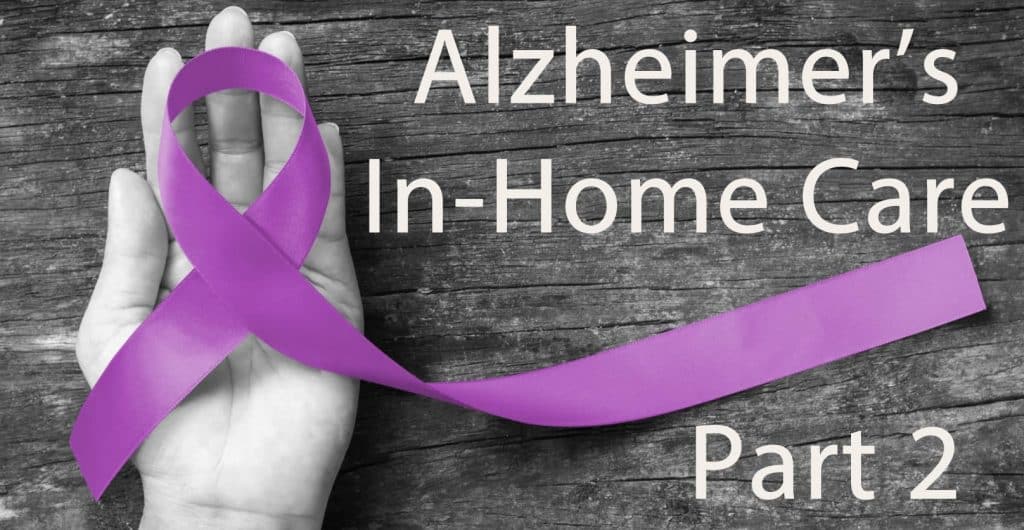
Supportive Living with Alzheimer’s: Tips for Daily In-Home Care
Welcome back to the second installment of our three-part series on Alzheimer’s in-home assistance. In part one, we explored the fundamental facts and statistics surrounding Alzheimer’s disease. Now, in part two, we dive deeper into practical strategies for daily living for Alzheimer’s in home care that empower both family caregivers and professional caregivers in providing exceptional support for those with Alzheimer’s in the comfort of their own homes.
Empowering Daily Living for Alzheimer’s In Home Care: Tips and Tactics
- Enhancing Cognitive Wellness: Engaging activities play a pivotal role in supporting cognitive function. Puzzle games, word searches, and memory exercises tailored to the individual’s abilities can help stimulate mental acuity and boost overall well-being.
- Meaningful Socialization: Regular social interaction is essential for maintaining emotional and mental health. Encourage participation in group activities or outings, ensuring a balance between familiar and new experiences to promote a sense of connection.
- Maintaining Physical Mobility: Regular physical activity offers numerous benefits for Alzheimer’s patients. Light exercises like walking, stretching, and seated movements can enhance circulation, maintain muscle tone, and alleviate restlessness.
- Structured Routine: Establishing a structured daily routine provides a sense of security and reduces confusion. Consistency in mealtimes, activities, and rest schedules helps individuals navigate their day more smoothly.
- Nutritional Support: Proper nutrition is vital for overall health. Prepare well-balanced meals rich in nutrients, focusing on fresh fruits, vegetables, lean proteins, and whole grains. Hydration is equally crucial—offer water and fluids throughout the day.
- Personal Hygiene: Maintaining personal hygiene can be challenging. Encourage regular bathing, oral care, and grooming routines as part of daily living for Alzheimer’s in home care. Choose a time of day when the person is most comfortable and cooperative.
- Safe Environment: Safety modifications in the home are essential. Remove tripping hazards, secure rugs, install handrails, and label areas with clear signage to prevent disorientation.
- Medication Management: Managing medications accurately is vital. Organize pillboxes or digital reminders to help individuals take their medications on time, ensuring their well-being.
- Effective Communication: Communication strategies evolve as Alzheimer’s progresses. Use nonverbal cues like facial expressions and gestures to enhance understanding. Maintain a soothing tone and avoid confrontational conversations.
- Emotional Support: Provide emotional reassurance and comfort. Offer hugs, gentle touches, and kind words to create a sense of security and trust.
- Sleep Routine: A consistent sleep schedule promotes restorative rest. Establish a calming bedtime routine, minimizing stimulating activities before sleep. Keep the bedroom environment comfortable and conducive to sleep.
- Adapting to Changes: As Alzheimer’s symptoms change, adapt your care approach accordingly. Stay attuned to cues indicating discomfort or preferences, and be flexible in your daily living for Alzheimer’s in home care caregiving methods.
Part two of our series on Alzheimer’s in-home assistance has discussed the heart of supportive living for those with Alzheimer’s. By embracing these expert tips and tactics, both family caregivers and professional caregivers can create an environment that fosters daily well-being and comfort. Our commitment to promoting the quality of life for individuals with Alzheimer’s continues in part three of this series, where we’ll explore essential insights into driving and Alzheimer’s care.
For expert guidance and compassionate support, contact SeniorCare Companions at 631-581-9000 and the Alzheimer’s Disease Resource Center (ADRC) at 631-580-5100. Together, we can make a difference in the lives of those living with Alzheimer’s. Stay tuned for part three, and let’s continue to enhance supportive living with Alzheimer’s for a brighter future.
As the population ages, families in New York, NY and across the nation are seeking viable solutions to ensure the well-being of their elderly loved ones. Senior day care has emerged as a popular option, offering a safe and engaging environment for seniors while providing caregivers with the respite they need. However, one common concern revolves around the cost of senior day care services. In this article, we’ll delve into the costs of senior day care in New York, NY, the role of home healthcare agencies, and how SeniorCare Companions can offer comprehensive support.
Understanding the Cost of Senior Day Care in New York, NY
Senior day care costs can vary significantly based on several factors, including location, type of services offered, and the level of care required. In New York, NY, where the cost of living is relatively higher, senior day care expenses tend to reflect these economic conditions. On average, senior day care costs in New York can range from $75 to $150 per day.
- Social Adult Day Care: These programs offer socialization, recreational activities, and supervision for seniors. On average, the cost can range from $75 to $100 per day.
- Adult Day Health Care: For seniors with more complex medical needs, adult day health care programs provide medical supervision, therapy, and assistance with medications. The cost for these programs can range from $100 to $150 per day.
The Role of Home Healthcare Agencies
Home healthcare agencies like SeniorCare Companions play a pivotal role in providing personalized care solutions for seniors. These agencies offer a wide range of services that cater to the unique needs of each individual, allowing seniors to remain in the comfort of their own homes while receiving the care and attention they require. Services offered by home healthcare agencies may include assistance with daily activities, medication management, companionship, and more.
How SeniorCare Companions Can Help
SeniorCare Companions is a reputable home healthcare agency that specializes in offering compassionate and comprehensive care for seniors in New York, NY. Their experienced caregivers are trained to provide not only physical assistance but also emotional support and companionship. Here’s how SeniorCare Companions can help with daily living for Alzheimer’s in home care:
- Personalized Care Plans: SeniorCare Companions creates customized care plans tailored to the specific needs and preferences of each senior. This ensures that seniors receive the right level of care that aligns with their individual requirements.
- In-Home Comfort: With SeniorCare Companions, seniors can continue living in the familiarity and comfort of their own homes. This reduces the stress and discomfort often associated with relocating to an external care facility.
- Companionship: Loneliness and social isolation can be detrimental to a senior’s well-being. SeniorCare Companions caregivers offer companionship, engaging in meaningful conversations and activities to promote mental and emotional health.
- Safety and Security: Home healthcare agencies prioritize the safety and security of seniors. Caregivers from SeniorCare Companions are trained to identify potential hazards and implement safety measures to prevent accidents.
- Flexible Services: Whether seniors require assistance for a few hours a day or around-the-clock care, SeniorCare Companions offers flexible service options that accommodate varying needs and schedules.
While the cost of senior day care in New York, NY, can be significant, it’s essential to weigh the benefits and the comfort it brings to seniors’ lives. Moreover, home healthcare agencies like SeniorCare Companions provide an alternative that allows seniors to receive the care they need within the familiarity of their own homes. With personalized care plans, companionship, a commitment to promoting seniors’ well-being, and daily living for Alzheimer’s in home care ideas, SeniorCare Companions stands as a reliable partner in ensuring the happiness and health of elderly loved ones in New York, NY.


